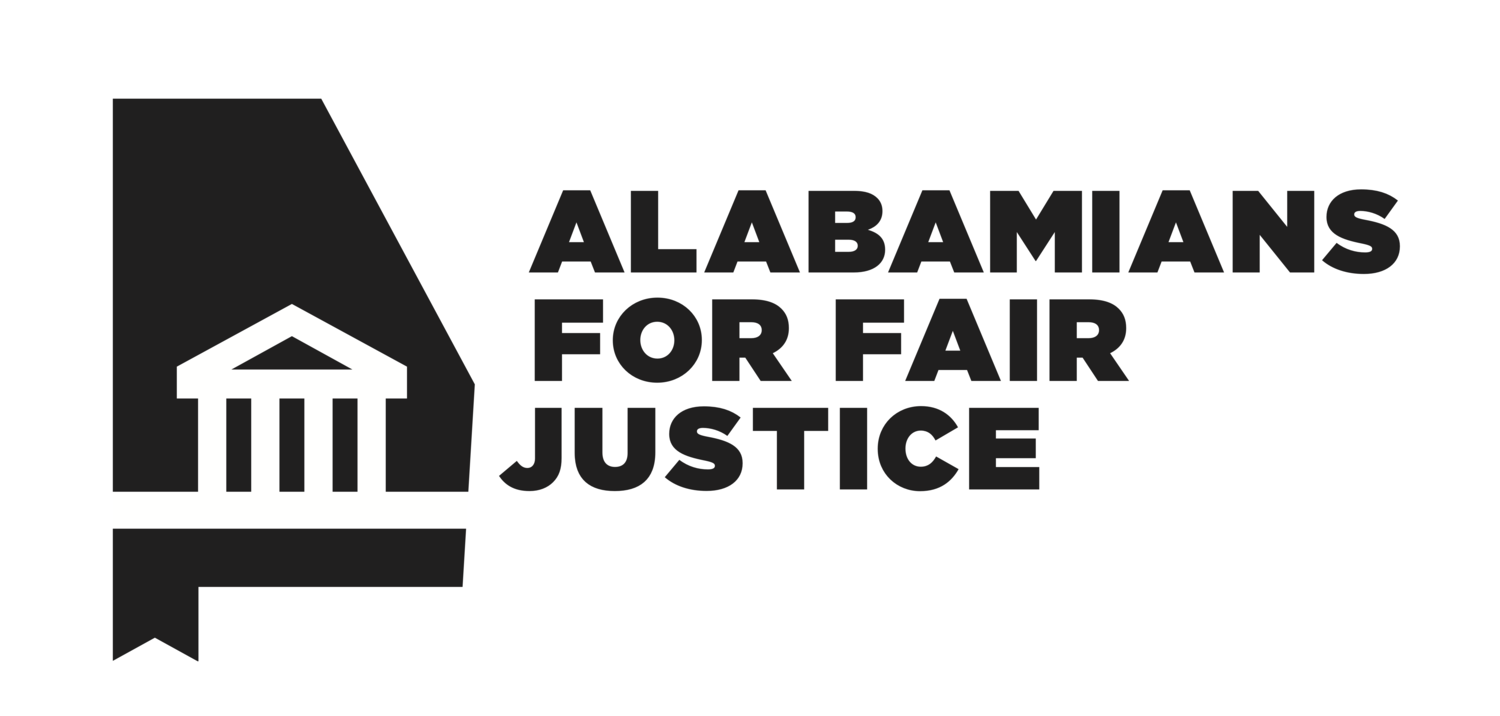Alabama’s Criminal Justice System Unfairly Punishes Low Income, People Suffering from Mental Illnesses
Montgomery, Ala— Today the Alabamians for Fair Justice Coalition announced recommendations to reduce recidivism in Alabama’s criminal justice system, including eliminating cash bail and excessive fees associated with diversion and re-entry programs, providing greater services to treat mental health and substance abuse, and using alternatives to incarceration, like citations instead of arrests for certain misdemeanors. The recommendations were sent as a letter ahead of today’s prison reform study group meeting at the Alabama State House.
“Alabama has one of the highest incarceration rates in the nation and punishments unfairly impact low-income and those suffering from substance use issues,” said Shay Farley, senior policy council with the Southern Poverty Law Center, an organization part of the Alabamians for Fair Justice Coalition. "In order to reform the criminal justice system, we must address a system of wealth-based detention, look at one’s ability to pay when assessing fines and fees, and treat substance use as a public health issue, not a crime.”
"It's past time for Alabama to stop relying on jails and prisons for mental health care services where community-based treatment is safer, more effective, and less costly," said Foster Cook, Director Emeritus of the Substance Abuse Programs at UAB and UAB's TASC Program, which administers drug courts, mental health courts, and Community Corrections programs for Jefferson County. "Proper funding of community-based mental health services is an important step toward reforming Alabama's prison system."
"In Alabama, people are caged, not because they have been found guilty of a crime, but because they don't have money to make bail,” said Brock Boone, staff attorney for ACLU of Alabama. “Wealth-based detention denies most people a fair chance at justice, disproportionately affecting Black people and other people of color. Those who lack financial resources to afford bail are seeing their constitutional protections violated, including their rights to due process, equal protection under the law, and protection under the Eighth Amendment."
The coalition’s recommendations include:
Jails: Alabama’s jails are overcrowded, and people arrested under the state’s cash bail system for misdemeanors, property crimes, and drug crimes are often stuck in jail for long periods of time -- not because they are considered dangerous -- but because they are too poor to post bail. Keeping someone in jail – even for a few days - can have devastating consequences to a person and his or her family.
We recommend:
Eliminate bail. It perpetuates a wealth-based justice system.
Limit pretrial detention to people that pose a risk to public safety.
Implement services like text- messaging reminders to encourage court attendance.
Increase the use of citations instead of arresting people for violations of local ordinances and certain Class C misdemeanors.
Mental health and substance use treatment: There are extremely high levels of drug addiction and people with mental illnesses among incarcerated people. Not addressing this fact contributes to overcrowding of jails and prisons, over incarceration of poor and vulnerable people and chronic recidivism. When possible, Alabama should move toward treating substance abuse and mental illness as a public health issue and not criminal justice issue.
We recommend:
Alabama provide for routine screening, assessment, and referral of people with mental illness and substance abuse during pre-trial, sentencing and post incarceration.
In lieu of incarceration, expand funding for treatment through the Department of Mental Health.
Ensure no person is denied diversion to treatment due to inability to pay.
Expand the use of Mental Health and Drug Courts.
Pretrial diversion and Community Corrections: Alternatives to incarceration are available in Alabama, but these programs lack uniformity, common standards and meaningful oversight. Costs and accessibility vary widely from county to county, and the programs rely on user fees, contributing to a two-tiered justice system where defendants with resources have access to alternatives and lower-income people are sent to jail or prison.
We recommend:
Adequately fund the existing diversion and community corrections programs and eliminate user fees to remove income disparities.
Codify oversight, roles and standards to ensure programs are uniform, productive, and compliant.
Establish statewide guidelines regarding drug tests and eliminate drug test user fees.
Require Alabama’s Department of Corrections (ADOC) to be held accountable for Community Corrections programs.
Mandate diversion programs look at ability to pay, including DA Diversion, Drug Court, and Court Referral to make sure the programs are unbiased and indigent individuals have fees waived. See this investigative piece on Alabama’s community corrections programs.
Reentry: Most individuals who have served their time leave prison with enormous court debt, including restitution, court costs, fines and fees associated with the underlying conviction. Failure to pay this debt can result in re-arrest, parole revocation, or an additional 30% collection fee. There are clear public safety risks, as research has shown that almost four in ten (38.3%) admitted to having committed at least one crime to pay to their court debt, including almost one in five (19.6%) whose only previous offenses were traffic violations.
We recommend:
Ensure that fines and costs are within one’s ability to pay and imposed over a reasonable time period and waive amounts that a person cannot afford to pay.
Allow at least six months in the community before people must begin paying fines and restitution.
Fully fund the judiciary so that judges, DAs, and the indigent defense system are not reliant on fees to keep operating.
Credit time served toward certain financial obligations.
Establish services within ADOC for people re-entering to have health care coverage and bridge medications.
Make parole reporting easier, including having weekend or evening reporting hours and using technology to make probation and parole reporting less time-consuming.
###
Alabamians for Fair Justice is a coalition made up of formerly incarcerated individuals and family members of those currently or recently serving time in Alabama’s prisons, advocates, and civil justice organizations.



